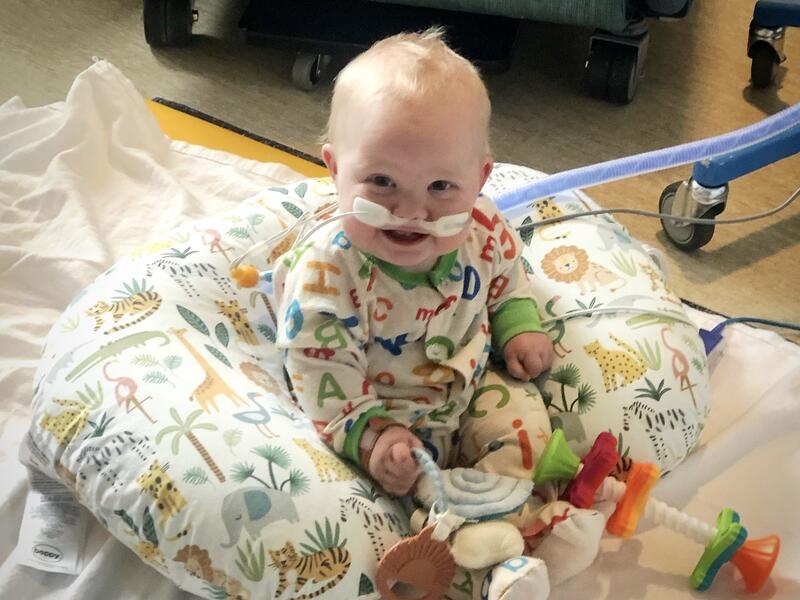Respiratory syncytial virus (RSV) vaccines and monoclonal antibody immunizations became available for the first time in 2023.
“This is a game-changer for everybody, honestly,” said Stephanie Hanson, M.D., a pediatrician at Sanford Children’s in Fargo, North Dakota.
The immunizations are the first ever to be approved for RSV by the Food and Drug Administration, and each is recommended for different groups of patients.
New CDC guidelines
To prevent severe RSV disease in infants, the U.S. Centers for Disease Control and Prevention recommends either maternal RSV vaccination or infant immunization with RSV monoclonal antibodies. Most infants will not need both.
RSV vaccine for pregnant people
- 1 dose of maternal RSV vaccine during weeks 32 through 36 of pregnancy, given September through January. Pfizer Abrysvo is the only RSV vaccine recommended during pregnancy.
RSV immunization for infants and young children
- 1 dose of the monoclonal antibody product, nirsevimab, for all infants younger than 8 months born during or entering their first RSV season.
- 1 dose of nirsevimab for infants and children ages 8–19 months who are at higher risk for severe RSV disease and entering their second RSV season. Considered higher risk are:
- American Indian and Alaska Native children
- Children with chronic lung disease of prematurity who require medical support during the 6 months before the start of their second RSV season
- Children who are severely immunocompromised
- Children with severe cystic fibrosis
RSV vaccine for adults ages 60+
- CDC recommends an RSV vaccine for everyone ages 75 and older and adults ages 60-74 at increased risk of severe RSV.
- Adults 60-74 who are at increased risk include those who:
- Have chronic heart or lung disease
- Have certain other chronic medical conditions
- Are residents of nursing homes or other long-term care facilities
- RSV vaccine data now shows the vaccine provides protection for at least two years.
- The best time to get vaccinated is in late summer and early fall — just before RSV usually starts to spread in the community.
If you have any questions about RSV or the products above, talk to your health care provider.
“Just like other vaccines, this antibody treatment and this vaccine are not 100% effective at preventing RSV, but what they really do well is decrease the severity of the illness. They’re known to cause a dramatic decrease in hospitalizations,” Dr. Hanson said.
Baby’s three trips to the hospital
One person who is familiar with RSV hospitalizations is Siri Thaden, a nursing manager at Sanford dermatology in Fargo. Last December, her son Ivar was hospitalized when he was just one month old after contracting RSV.
“He started with just some congestion and then I noticed he was not eating as well,” Thaden said. “When he started having fevers up to 105 degrees, that’s when I knew I had to bring him in.”
She brought Ivar to the emergency room, and after another day of labored breathing, he ended up in the intensive care unit.
“There is nothing scarier than when your child is struggling to breathe because you don’t have a lot you can do,” Thaden said. “They had him all hooked up to different things, putting high flow oxygen on him. But I knew we were in the place we needed to be.”
Ivar’s RSV led to bronchiolitis, an infection that causes swelling and mucus buildup in the smaller airways of the lung, which can be much more dangerous in infants.
“(Infants) have less ability to compensate,” said Dr. Hanson. “So if they get plugged up with mucus, it’s hard for them to eat. It’s hard for them to breathe. They get dehydrated. They really struggle.”
That wasn’t the end of the health scares for the Thaden family though. After five healthy months, Ivar once again contracted RSV in the spring, sending him to the hospital on Memorial Day weekend. Then it happened a third time in mid-June, when he spent five days at Sanford Children’s.
“I just really felt defeated as a mom,” Thaden said. “You just kind of ask yourself as a parent, ‘What am I doing wrong?’ To have so little control … it’s the worst feeling.”
Thaden says she’s thankful the new RSV treatment is available, so that other babies can avoid what happened to Ivar.
“I am just so filled with hope and so grateful that is an option,” she said. “For me, seeing how devastating RSV was for my little boy … I don’t want that for any parent.”
Where to get RSV vaccine
RSV vaccines and antibody treatments are available at Sanford Health clinics near you.
Find more information about immunizations at Sanford Health.
Learn more
- Is it a cold or RSV? Know when to call your child’s doctor
- What is RSV and how can you prepare?
- Small-town care was ready when baby needed it
…
Posted In Children's, Emergency Medicine, Family Medicine, Immunizations

